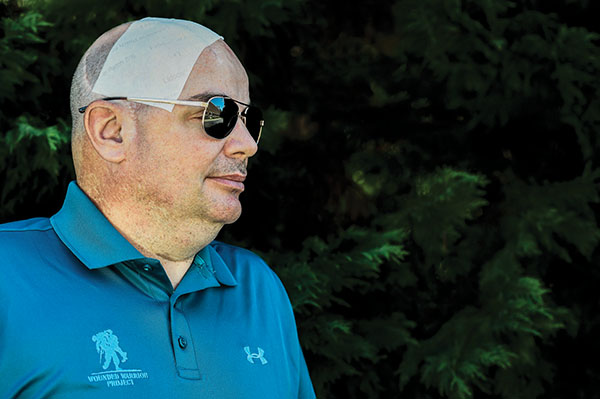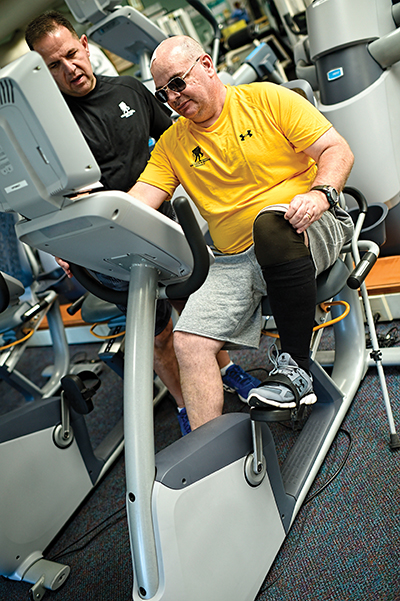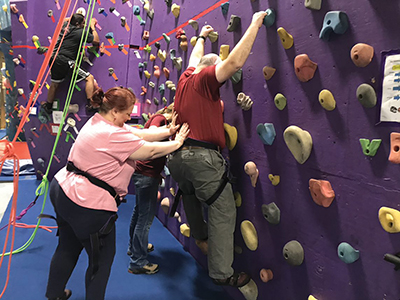
The Path of Positivity: Journeying Back to Independence and Well-Being
John Goubeaux has made a big comeback since his traumatic brain injury nine years ago. “I just like to follow the path of positivity in trying to get back. I’d like to one day be a peer mentor for brain injuries, showing others that you can do a lot more than what you think you can. Each brain injury is different, but just don’t give up. Press on.”
Many people approach fitness with objectives like losing weight or gaining strength. John Goubeaux had two important goals: to avoid narcotic painkillers, and to exercise daily again like he did when he was an active duty airman.
Both those goals were challenging for an injured veteran who went through major surgery to save his life nine years ago after a traumatic brain injury. John’s positive attitude and a healthy dose of coaching from Wounded Warrior Project® (WWP) are helping him defy the odds and reach his goals.
John went from being an active 41-year-old with a long career in the U.S. Air Force to being in an induced coma after a fall from the back of a flatbed vehicle at Pope Air Force Base in North Carolina. Because of brain swelling, doctors removed part of his skull to allow the brain to heal, and they closed the opening once the swelling went down.
“At first I could hear, but I couldn’t move,” John recalled. “I couldn’t brush my teeth, and I couldn’t really feed myself. My skull was open for 10 weeks before they could close it back up. When I returned home, I lived on the recliner because I had vertigo so bad that the room would constantly spin when lying down. I lived on the recliner for three and a half years.”
John heard about WWP through a TV ad. He called to register and started attending WWP events with his wife, Vicky. They soon learned about WWP’s Independence Program.
The program is a partnership between WWP, the warrior, and his or her family or caregiver, and is uniquely structured to adapt to their ever-changing needs.
Warriors who rely on others because of moderate to severe brain injuries, spinal cord injuries, or other neurological conditions are paired with specialized case managers. This allows them to develop personalized plans to restore meaningful levels of activity, purpose, and independence into their daily lives. For many, this is an opportunity to participate in the types of daily tasks and meaningful activities others take for granted.
“When John got hurt, he went from being an active person to an injured person who was healing but who wasn’t moving a lot,” Vicky said. “After becoming part of Wounded Warrior Project’s Independence Program, he’s been able to do things the doctors said he wouldn’t do again.”
Vicky remarked on John’s ability to do day-to-day things like going to the grocery store and riding a bicycle. “John has come out of his shell and has been able to tackle a lot of these independence issues. The turnaround has been amazing. Wounded Warrior Project makes it work for him.”
Independence for John translates into well-being for Vicky. “The emotional side – that’s where Wounded Warrior Project has made an amazing difference not only for John but in my life, too,” Vicky said.
John’s routine now includes morning physical therapy at a local health center with a coach provided by WWP. “I go swimming with my wife, I do an hour on a gym’s recumbent bike, and I do senior strength training,” John said. “Then I shower and go get lunch with my coach. We do this twice a week from 8 am to 1 pm every Monday and Wednesday.”

Warriors who rely on others because of moderate to severe brain injuries, spinal cord injuries, or other neurological conditions are paired with specialized case managers. This allows them to develop personalized plans to restore meaningful levels of activity, purpose, and independence into their daily lives. For many, this is an opportunity to participate in the types of daily tasks and meaningful activities others take for granted.
“When John got hurt, he went from being an active person to an injured person who was healing but who wasn’t moving a lot,” Vicky said. “After becoming part of Wounded Warrior Project’s Independence Program, he’s been able to do things the doctors said he wouldn’t do again.”
Vicky remarked on John’s ability to do day-to-day things like going to the grocery store and riding a bicycle. “John has come out of his shell and has been able to tackle a lot of these independence issues. The turnaround has been amazing. Wounded Warrior Project makes it work for him.”
Independence for John translates into well-being for Vicky. “The emotional side – that’s where Wounded Warrior Project has made an amazing difference not only for John but in my life, too,” Vicky said.
John’s routine now includes morning physical therapy at a local health center with a coach provided by WWP. “I go swimming with my wife, I do an hour on a gym’s recumbent bike, and I do senior strength training,” John said. “Then I shower and go get lunch with my coach. We do this twice a week from 8 am to 1 pm every Monday and Wednesday.”
“My coach gets the menu from the restaurant and gives me a chance to read it and mark what I would like to have before we walk into a line or a crowded place,” John said. The advance preparation helps ease any tension.
For the first three years of John’s recovery, Vicky was by his side day and night. When it came time to graduate to the next level of health coaching, they wanted to do it together.
“Understanding all the information together is nice,” John said. So, John and Vicky attended a WWP physical health clinic and signed up for wellness coaching together.
“The wellness coach makes the exercises adaptable to me,” John said. “They were able to figure out things so that I could participate.”
As an immediate result of their physical health wellness coaching, they each lost about 20 pounds. They learned to use TRX equipment, which they continued to practice with at home. John and Vicky have also been able to control their portion sizes whether they eat in or out. “We use smaller plates, and we cut the meal in half and put it in a to-go box right away,” John said. “It really makes a difference. The wellness coaching has helped both my physical and mental health.”
“Even without a brain injury, our bodies degrade every year,” John said. “It’s good to start taking care of your body early. The wellness coaching through Wounded Warrior Project has helped control my blood sugar, lower my blood pressure, and manage my mental health. My ultimate goal is to wear the clothes I wore during active duty, which means going from my previous 262 pounds to 189 pounds.”
John and Vicky have become an inspiration to other warriors and families. John said it’s empowering that now he can be the warrior carrying others – as illustrated in the WWP logo.
“I feel empowered because I’m able to give back. That’s why we’re here, to make it better than when you arrived in your day. You never know how a small gesture of positivity can last a lifetime in somebody else. It comes back to you, too. That’s why we press on.”
John and Vicky continue to attend WWP events and meet new families. And John talks about his experiences with other warriors and outside groups.

“Feeling positive, knowing that I’m encouraged by others, and that I can still do something helps me move forward,” John said.
“I remember the neurologist said my life’s a blank sheet of paper. And the way that I felt back then was like a wind-up toy, like a wind-up tin soldier that keeps running into a wall. But Wounded Warrior Project set me on a positive path, one step at a time.”
John Goubeaux’s routine includes morning physical therapy at a local health center with a coach provided by WWP. Every journey is different. WWP’s independence Program and Physical Health and Wellness coaching are designed to meet warriors where they are on their journeys, and help them plan paths forward.
John and Vicky Goubeaux found a supportive extended family at Wounded Warrior Project. “The emotional side – that’s where Wounded Warrior Project has made an amazing difference not only for John but in my life, too,” Vicky said.
About the Author
As Chief Program Officer, Jennifer Silva oversees strategy and innovation for current and future Wounded Warrior Project initiatives. She leads Wounded Warrior Project staff in creating cutting-edge programs that assist warriors as they transition to civilian life. Jennifer is a graduate of the U.S. Military Academy at West Point and served in the Army as a logistics officer. Before coming to WWP, Jennifer worked in the financial field, owned her own business, and was a secondary school educator.
About Wounded Warrior Project
Since 2003, Wounded Warrior Project® (WWP) has been meeting the growing needs of warriors, their families, and caregivers – helping them achieve their highest ambition. WWP is a national, nonpartisan organization accredited with the Better Business Bureau (BBB), top rated by Charity Navigator, and holding a GuideStar Platinum rating. To get involved and learn how WWP connects, serves, and empowers, visit http://newsroom.woundedwarriorproject.org/about-us.




